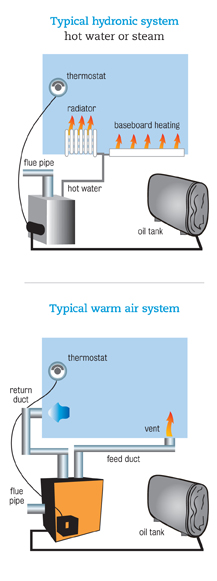|
It's not too often homeowners think about the condition of their oil tanks. With so many things around the house to keep tabs on, that oil tank down in the basement is often times forgotten. It's recommended to inspect your oil tank at least once per year. There is a law that Massachusetts has in place to address oil leaks from home heating systems (Chapter 453 of the Acts of 2008, as most recently amended in 2010). This law has two major provisions that require:
Most insurance policies do not currently include such coverage, leaving many homeowners responsible to foot the hefty cleanup bill themselves. Although it is mandatory that insurance companies make this coverage available by July 1, 2010 to homeowners whose systems are upgraded, the insurance is an optional purchase. Paying now to upgrade from a leaking tank and installing the proper valve/sleeve can possibly save you LOTS of money in the future. Clean up costs for a small leak CAN cost up to $15,000 and more extensive leaks, ones that have contaminated groundwater can cost upwards of $250,000. A checklist to follow when inspecting your tank is provided below:
1 Comment
Ever wonder what exactly is going on when you turn up your thermostat or when you hear your furnace kick on? When heating with oil, your home will be equipped with one of these three systems: Forced hot water, by means of baseboard, steam which utilizes radiators, or warm air which would be blown through vents. The thermostat works by sensing when the room temperature falls below the set temperature. Once that happens a signal will be sent to your heating system to turn on. Once engaged, oil travels from your tank into the burner. As the fuel and air mixture is injected into your burner it is then ignited in the combustion chamber. For heating that uses water, there will be either a cast iron or steel boiler where the water is heated. From there it will be circulated through your baseboards or, in the steam system, heated up and turned into steam to then go through your radiators. With warm air, instead of heating water, your furnace simply heats air which is then dispersed through your home by means of a blower. Your chimney is the last step of this process. Emissions caused from the combustion process is then emitted through a flue vent right out your chimney. Keep in mind that with today's ultra low sulfur fuel oil we are leaving a smaller footprint than ever before all while efficiently and cost effectively heating our homes.
Even though prices are the lowest they have been in quite some time, saving money and conserving is always a good thing!
HEAT SAVING TIPS:
Learn more about general oil information on our FAQs page |
Fitchburg Economy OilDavid A. ChampaArchives
January 2018
Categories |
Terms and Conditions
Fitchburg Economy Oil (c) 1939-2021
Fitchburg Economy Oil (c) 1939-2021


 RSS Feed
RSS Feed